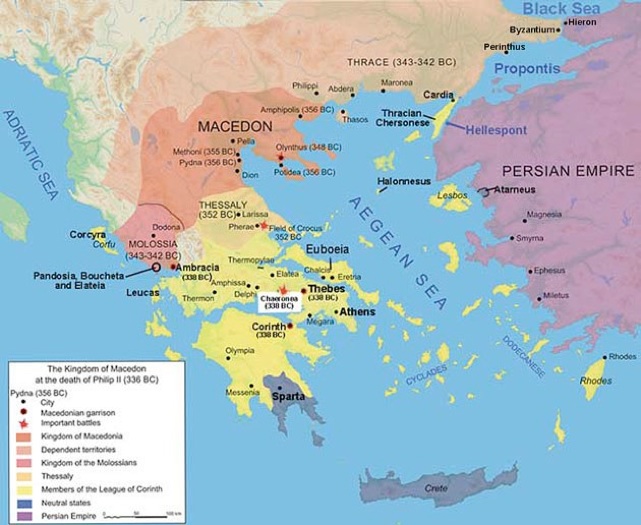Foreign Wars
Eastern Mediterranean (360 - 282 BC):
Alexander III of Macedonia (336 - 323 BC)


Foreign Wars
Eastern Mediterranean (360 - 282 BC):
Alexander III of Macedonia (336 - 323 BC)

Adapted from Wikiwand
In Construction
Philip II appointed a general called Antipater to govern Macedon as his regent while he campaigned in Thrace. When Philip died in 336 BC, Antipater became an adviser to Alexander the Great, who set out for the East in 334 BC, leaving Antipater as both regent in Macedonia and strategos of Europe. Thus, Alexander of Epirus had little scope for independent action at home, and it is unsurprising that he apparently welcomed the Tarentine’s invitation to spread his wings in Magna Graeca. (From this point, the exploits of Alexander the Great no longer concern us, and I can therefore refer to Alexander of Epirus as ‘Alexander’).
Alexander the Great reimposed Macedonian rule on Athens in 335 BC.
Athens prospered thereafter under Lycurgus, who, as Periklis Deligiannis (referenced below, at pp. 4-6) pointed out:
“... was essentially in control of the Athenian State finances for at least 10 years (until his death in 324 BC), [and had used his position] to strengthen the economy, the army and the fleet. Being a member of the anti-Macedonian faction and knowing ... that a new war against Alexander was inevitable ... [he also] revitalised [the naval base at nearby] Piraeus. Because of his services to Athens, he can be compared to Themistocles, the actual founder of the Athenian navy and the harbour and city of Piraeus”
t
Antipater and Athens (323 - 319 BC)
Alexander died in 323 BC, leaving his half-brother, Philip III Arrhidaeus, and his posthumous son, Alexander IV, as his heirs, and the scene was set for the wars of the Diadochi (the rival generals of Alexander, who now fought for control of the much-extended Macedonian Empire). The regent, Antipater, brought the two kings to Macedonia and gave up the pretence of ruling the rest of the empire, leaving Ptolemy Largides as satrap of Egypt and Antigonus Monophthalmus as satrap of Asia Minor.
Antipater’s position in Macedonia itself was secure, but his hold on the Greek states was precarious. The Athenians duly assembled a military coalition and declared war against him, but its army became bogged down when it laid siege Antipater at Lamia (just north of the pass of Thermopylae). Meanwhile, Antipater had assembled a large fleet that defeated the Athenian fleet at Amorgus (60 miles south west of Samos) in 322 BC, bringing the war to an end. Periklis Deligiannis (referenced below, at pp. 6-7) observed that:
“... although 200-250 Athenian warships ... [survived] in the [shipyards] of Attica, ... this was a ‘ghost fleet’, since there were no [oarsmen] to move it (after the exile of over 12,000 Athenians by ... Antipater and ... the heavy losses [at Lamia]). These ships were left to rot, and the Athenians never again built a great fleet ... because the financial burden of such a venture would [have been] unbearable, for Athens [or] any other [Greek] city-state.”
Antipater was thus able to reimpose Macedonian rule throughout Greece and to establish a number of permanent garrisons, one of which was on the Munychia hill, overlooking the harbour at Piraeus.
Antipater died in 319 BC, having named his colleague, named Polyperchon, rather than his son, Cassander, as his successor. Cassander appealed to Antigonus, who formed an alliance with Ptolemy and Lysimachus (the satrap of Thrace) against Polyperchon. This led to the so-called Second Diadochi War (319 - 316 BC), which ended with:
✴Antigonus in command of most of Asia Minor;
✴Ptolemy in command of Egypt; and
✴Cassander ruling Macedonia and its Greek possessions as regent for Alexander IV (after Philip III was killed in 317 BC).
The Athenians, who had chosen the losing side during this war, had been forced to come to terms with Cassander in 317 BC. Diodorus Siculus (at ‘Library of History’, 18: 74: 3) described the terms of the peace. In summary:
✴Athens became a ‘friend and ally’ of Macedonia, which was presumably a tactful way expressing the Athenians’ loss of control over their external relations;
✴Cassander had the right to designate an Athenian citizen to govern the city, while an oligarchy made up of citizens who met a specific property qualification undertook its day-to-day government;
✴Cassander maintained the garrison at Piraeus (allegedly on a temporary basis); and
✴Athens retained its ‘ghost’ navy, its revenues, and some unidentified possessions.
The citizen whom Cassander appointed as governor of Athens and commander of the garrison was the statesman/ scholar Demetrius of Phalerum, who was almost certainly in post by the time that Timaeus arrived in the city.